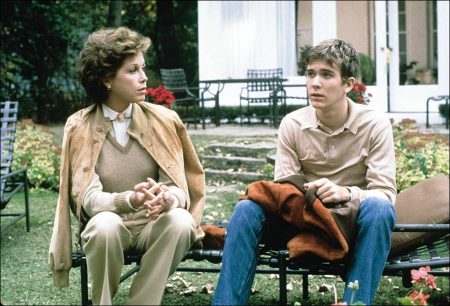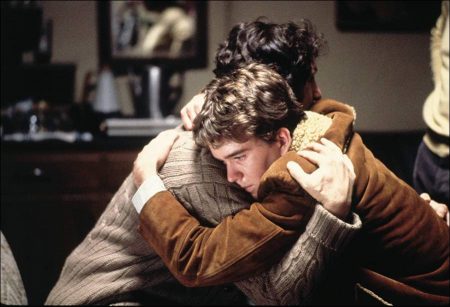Taglines: Everything is in its proper place… Except the past.
Ordinary People movie storyline. In Illinois, the upper-middle-class family Jarrett is living a trauma in their lives, with the loss of their beloved son Buck followed by the attempt of suicide of his younger brother Conrad. Conrad’s father Calvin is a good man of few words and his mother Beth is a cold-hearted woman that loved Buck and has always been bitter and never supported Conrad, who is under therapy with Dr. Berger.
The greatest concern of Beth is to live her perfect life, denying affection to her son. Conrad blames himself for the death of his brother since they were sailing in a bad weather and when one string jammed in the block, he was not able to release it, capsizing the boat. Conrad has difficulties to reestablish his relationship with his friend and quits the swimming team of his school.
When Conrad meets Karen, who was interned with him in the same psychiatric clinic also for attempt suicide, he feels better. And when he dates the gorgeous student from the choir Jeannine, he begins to see the world with other eyes. But his problem of relationship with his mother associated to the death of Karen, who committed suicide, brings him back to the rock bottom and he runs to meet Dr. Berger. Will the psychiatrist succeed in helping Conrad?
Ordinary People is a 1980 American drama film that marked the directorial debut of actor Robert Redford. The film stars Donald Sutherland, Mary Tyler Moore, Judd Hirsch, Timothy Hutton, M. Emmet Walsh, Elizabeth McGovern, Dinah Manoff, Fredric Lehne, James Sikking, Basil Hoffman and Elizabeth Hubbard.
The story concerns the disintegration of an upper-middle class family in Lake Forest, Illinois, following the accidental death of one of their two sons and the attempted suicide of the other. The screenplay by Alvin Sargent was based upon the 1976 novel Ordinary People by Judith Guest.
The film received six Academy Awards nominations and won four: the Academy Award for Best Picture, Best Director for Redford, Adapted Screenplay for Sargent, and Supporting Actor for Hutton. In addition, it won five Golden Globe Awards: Best Motion Picture – Drama, Best Director (Redford), Best Actress in a Drama (Tyler Moore), Best Supporting Actor (Hutton), and Best Screenplay (Sargent).
Film Review: Ordinary People
The Jarretts are of the Wasp family now common in most parts of the continental United States. They are Calvin Jarrett, a successful tax lawyer, Beth, his immaculately pretty wife, who runs the family as if life were something to be organized like a tennis tournament, and 18-year-old Conrad, their surviving son, 14 months younger than Bucky Jarrett, who died a year and a half earlier.
The Jarretts are ordinary people, but they are extraordinarily privileged. They live in upper-middle-class splendor in Lake Forest, still Chicago’s poshest suburb, and though the Jarretts don’t live on a scale comparable to that of the ”old” Lake Forest families, whose pre-World War I fortunes had their origins in meat packing, banking, railroading and mail-order retailing, they inhabit a beautiful house that is much too big for them, have two cars, a country-club membership and can afford vacations anywhere in the world whenever it suits them.
In her spare, efficient, best-selling novel, Judith Guest, seemingly without trying, dissected the contemporary white Anglo-Saxon Protestant psyche when, by accident, such perfect order is destroyed. Recently achieved economic and social privilege is no defense against emotional chaos. Privilege is a plywood treehouse in a hurricane.
The very real achievement of Robert Redford, who makes his directorial debut with ”Ordinary People,” and of Alvin Sargent, who meticulously adapted Miss Guest’s novel for the screen, is that the Jarretts become important people without losing their ordinariness, without being patronized or satirized. ”Ordinary People,” which opens today at the Loews Tower East, is a moving, intelligent and funny film about disasters that are commonplace to everyone except the people who experience them. Not since Robert Benton’s ”Kramer vs. Kramer” has there been a movie that so effectively catches the look, sound and temper of a particular kind of American existence.
The Jarretts are not only ordinary people, they are also ”nice” people. They wear the right clothes, read the right books, eat the right things and misbehave discreetly. They put great store in selfcontrol, as much in the privacy of their own house as abroad in the company of friends or strangers. The problem is that such niceness and control cannot accommodate the fears, furies and resentments occasioned when things go to pieces.
At the start of ”Ordinary People,” young Conrad Jarrett (Timothy Hutton) has been home from the hospital for just a month and is trying very hard to resume life – school, the swimming team, the glee club – as if, five months earlier, he hadn’t attempted suicide by slashing his wrists. Anyone looking at Conrad can tell that he is a wreck. He doesn’t eat. He’s nervous and he’s too quick to say whatever he knows his mother and father want to hear.
Though Calvin (Donald Sutherland) worries about Conrad, he is unable to do much more than be enthusiastic in response to everything Conrad says. Beth (Mary Tyler Moore), resolutely pretends that there’s nothing wrong with her son. She goes about her daily routine of golf, tennis, bridge and committee meetings with the determination not of someone living the good life in suburbia, but of a woman climbing Everest. Her jaw is set. She doesn’t look back or down.
She’s quite right when she says at one point, ”We’d have been all right if there hadn’t been any mess.” The Jarretts’s ”mess” was the accidental drowning of Bucky Jarrett one summer afternoon when he and Conrad were sailing together on Lake Michigan. Bucky, the strong one, gave up and drifted away from the overturned boat. Conrad survived, in guilt and sorrow, but when he realized he couldn’t be the son Bucky was, he chose suicide.
More than five months after the suicide attempt, Conrad is in even worse shape than before. His mother, he tells the psychiatrist, will never forgive him for, among other things, having ruined the bathroom rug when he cut his wrists. ”She had to pitch it out,” he says. ”They even had to regrout the tile floor.”
In several ways, Mr. Redford’s film is far more effective than the novel. It’s difficult to write about people who cannot talk to each other because writing is itself a kind of talking. Mr. Redford’s film demonstrates this lack of communication, the inability to express affection, in scenes of sometimes overwhelming pathos – a Christmas Day gone all to hell for Conrad when his mother, as if in reflex, refuses to have her picture taken with her son.
Though ”Ordinary People” focuses on the rehabilitation of Conrad, mostly through the efforts of a wise, understanding, quick-witted psychiatrist, played by Judd Hirsch, the film’s most interesting character is Beth Jarrett, a Bonwit Teller lady hanging onto her sanity by fingertips made of steel.
Miss Moore is remarkably fine, simultaneously delicate and tough and desperate. The only reason she doesn’t dominate the film is that all the other performances are equally good. Mr. Hutton is excellent in the difficult role of the deeply troubled boy, a nascent jock who, had there been no accident, might have gone through life always in second place and growing nothing much more than a slight paunch. Mr. Sutherland realizes his best film role in years, playing a fellow who, filled with love for both his wife and his son, is angrily accused by each of fence-sitting, of being weak and indecisive when he’s really the only one in the family with some idea of what is wrong.
The supporting roles are splendidly handled by Mr. Hirsch, by a sweet newcomer named Elizabeth McGovern, as the girl who falls in love with Conrad despite Conrad’s conviction that he is a no-good kid, and by Dinah Manoff, in the brief but splashy role of a young woman who shared Conrad’s time in the psychiatric hospital.
Mr. Redford’s appreciation for his actors is apparent, but it is also disciplined. ”Ordinary People” doesn’t look like any director’s first movie. With the exception of fleeting flashbacks, which are necessary, I suppose, for exposition, the film’s manner is cool, gentle, reserved. It never forces the emotions. It watches them erupt and allows us to make of them what we will, that is, until the last few minutes.
Though the film’s ending approximates the novel’s, it doesn’t play very well on the screen. It’s ordinary in the least interesting cinematic way. That, however, may be nit-picking. ”Ordinary People” is otherwise so good – so full of rare feeling – that it would be presumptuous for a critic to attempt to re-edit it.
Ordinary People (1980)
Directed by: Robert Redford
Starring: Donald Sutherland, Mary Tyler Moore, Judd Hirsch, Timothy Hutton, M. Emmet Walsh, Elizabeth McGovern, Dinah Manoff, Fredric Lehne, James Sikking, Basil Hoffman, Elizabeth Hubbard
Screenplay by: Alvin Sargent
Cinematography by: John Bailey
Film Editing by: Jeff Kanew
Costume Design by: Bernie Pollack
Set Decoration by: William B. Fosser, Jerry Wunderlich
Art Direction by: Phillip Bennett, J. Michael Riva
Music by: Marvin Hamlisch
MPAA Rating: None.
Distributed by: Paramount Pictures
Release Date: September 19, 1980
Views: 232



